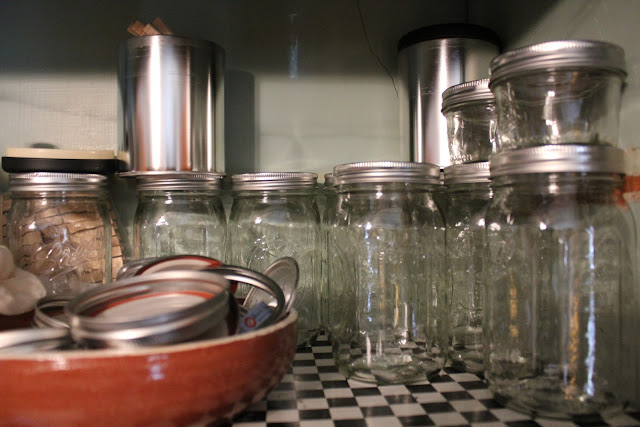I want to dedicate a post to bulk food buying and storing. This is a really simple thing, but something that has completely changed the way I shop, cook for myself and my diet. While I bought in bulk before this project (haha seems SOO long ago), I hadn't ever adopted bringing in my own jars to fill. Part of the downside of this is you have to (1) remember your jars, (2) you have to go home and get your jars, so it makes it more difficult to run to the grocery on the way home from work/school. Regardless, if I were buying in ALL bulk, I probably would have realized that having tons of plastic bags with twist-ties around the in the cupboard wasn't exactly the most efficient way of storing food. I am now the proud owner of 48 mason jars (plus a few)! You need a variety of sizes to use cupboard space efficiently and not have to carry more jar around than you need on trips to the grocery store.
Here is the breakdown:
_12 half pint jars (yeast, dips, spreads, butters, portable containers for sauces/food)
_12 pint jars (baking soda, beeswax, make good drinking glasses, good size for leftover sauces)
_24 24 ounce jars (wild rice, flax seed, maple sugar, salt, nuts)
_3 64 ounce jars (I keep 'other' flours in these and crackers)
_2 huge jars (pasta, all purpose flour -I go through a lot of this)
When you bring in a jar to the co-op, weigh it first and write down the weight (ex. TARE 0.64 lbs). Fill with whatever bulk ingredients and write the number (usually 6 digits on container) on another sticker for the jar. You don't have to weigh it after you fill it. At checkout they simple subtract the weight from the TARE and charge you that.
By buying all the same kind of jars, they are easily stack able in the cupboard and you have use space more efficiently. For anything that doesn't come in bulk bins (produce), you don't need a bag for these either! I think some people must think it is gross to just throw the produce into the basket and then put it directly on the belt when checking out. OR, people think that the checkout would PREFER that you bag things. This probably isn't the case because they have to find the sticker and count the number of items in each bag, which is more difficult when in bags. Produce certainly doesn't go directly from a plant to the grocery bin. Lets consider for a moment how many different surfaces your produce has touched before it go to you:
(1) hands picking produce at harvest
(2) hands and boxes sorting produce
(3) hands and boxes for shipping
(4) hands and boxes for storing
(5) hands and grocery surfaces (maybe even the floor if dropped) when placing in display bins for purchasing
(6) LOTs of hands picking through produce at the store
So, maybe it isn't such a big deal if that tomato isn't wrapped in plastic to go from the bin to the checkout-and, it will save you a bag.
I have bowls inside my cupboard for produce that isn't refrigerated (potatoes, garlic, shallots, apples). And bowls inside my refrigerator to organize food in there (peppers, tomatoes...) I keep my greens in a vase of water on the counter (they last longer this way, don't take up space in the refrigerator and make a pretty little rotating green bouquet on the counter :)
 |
| plastic bags provided at co-op in bulk section (not being used in this project) |
 |
| non-refrigerated produce in bowls |
 |
| flours |
 |
| spice/herb jars |
 |
| extra jars |
 |
| huge jar! |
 |
| bulk mason jars |
FROZEN FOODS:
The weather is getting colder, I've been surprised to see how many greens and vegetables are still available at the farmer's markets and the co-ops. I can still find local: garlic, tomatoes chard, kale, basil, and lots of different kinds of peppers. The 'fall' crops are probably going to be around for a while (potatoes, squash, apples). However, because I don't know when things will start to disappear, I've started to freeze things that I'm scared about :/
So far I've frozen:
_made a large batch of pesto and frozen it it into muffin cups for single servings
_frozen pears (which are now gone)
_frozen hot peppers
Things that are gone for good:
_fresh herbs (except basil which reappeared a few days ago after being gone for a week)
_spinach
_berries
_melons
_corn
_beets
_cucumber
Things that are here to stay :) (not dependant on season)
_milk
_sunflower oil
_cheese
_flour? grains?
_dried herbs
_nuts?
_sugar
_maple syrup
I will hopefully be able to harvest my first greens in the next few weeks. I have a small herb garden that probably won't be ready for a while (cilantro, rosemary, basil and lemon balm).
.JPG) |
| frozen in masons |
 |
| pesto frozen in muffin tin, then placed in hot water (only for a second) to get loose |

No comments:
Post a Comment